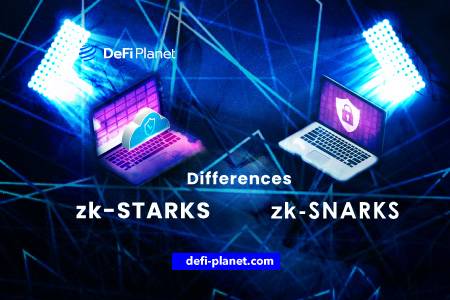People use cryptocurrencies for a variety of reasons, among the most important of which are privacy and anonymity when conducting transactions. These are some of the ways in which the Decentralized Finance (DeFi) space differs from traditional finance (TradFi).
Some blockchain-based platforms are built with zero-knowledge proofs to enhance privacy. Some blockchain platforms are known to be more private than others.
Zero-knowledge proof technologies are designed to add privacy elements to blockchains such as Ethereum. This technology enables a person to demonstrate knowledge without disclosing specifics to the other party.
It is classified into two types: zk-STARKs and zk-SNARKs.
This article examines the concept of zero-knowledge proof as well as the differences between zk-STARKs and zk-SNARKs.
What is Zero-Knowledge Proof?
In 1985, three prominent computer scientists, Shafi Goldwasser, Silvio Micali, and Charles Rackoff, proposed the concept of zero-knowledge proof.
They described this technology in their paper, “The Knowledge Complexity of Interactive Proof-Systems.”
This technology enables a person to demonstrate to another person that they have knowledge of data or information without revealing its actual content.
Zero-knowledge proof enables transaction verification without disclosing the transaction details to the public or other participants. Because transactions are verified quickly, transaction speed on blockchains improves.
Because this technology only provides data that can demonstrate that something is true without providing specific information, it is regarded as a probabilistic evaluation.
Zero-knowledge proof is significantly impacting the Web3 space. The following are some examples of solutions created using zero-knowledge proof.
- Zcash, a popular privacy coin in the blockchain space, was created using the zk-SNARKs technology.
- The zero-knowledge proof concept significantly impacts the Internet of Things (IoT) sector because “integrating ZKPs in sensitive systems such as the Internet of Things can help ensure that information flows without gaps.”
- Zero-knowledge proof can be applied in authentication, as “users can be verified without having to disclose private information such as passwords.”
- In machine learning, individuals can be convinced of the “model’s outcomes using zero-knowledge proof without revealing any information about the model itself.”
Zcash employs the zero-knowledge proof concept. Although Zcash has a privacy feature, it must be activated by the user. Users are expected to set up a Genesis block and then place their trust in the initial setup. Monero is another privacy network that uses ring signatures.
The following features distinguish zero-knowledge proof from others:
Zero-Knowledge
This feature means that the verifier cannot access the details of a transaction; instead, they can only know that the transaction occurred.
Completeness
In this case, the verifiers are sure that the prover is honest and only submits accurate data.
Soundness
In this regard, the verifier is outfitted with the capacity to detect any issues.
What are the differences between zk-STARKs and zk-SNARKs?
zk-SNARKs differ from zk-STARKs in that they mean zero-knowledge succinct non-interactive knowledge arguments and zero-knowledge scalable transparent knowledge arguments, respectively.
Meaning
zk-SNARK is an earlier version of zero-knowledge proof technology, which permits one participant to prove that they possess certain information without having to show the content of the information. Usually, a secret key is utilized to accomplish this. Zcash is a popular cryptocurrency built with this technology.
Alessandro Chiesa, a UC Berkeley professor, invented it and published a paper on it in 2012. The elliptic curve serves as the foundation of their security architecture.
The probability that the security architecture of elliptic curves could be compromised by quantum attacks exists, and this is one of the reasons this technology is criticized.
zk-SNARKs also function with the aid of a trustworthy setup that generates the keys. A secret parameter is created for different transactions between one address and another. The trusted setup must be efficient before platforms that rely on this technology can function effectively.
The first trusted setup exists between a prover and a verifier, and some parameters are created to demonstrate that a transaction is valid.
The zk-STARK technology is an updated version of the zero-knowledge proof technology. It was developed by Michael Riabzev, Iddo Bentov, Eli Ben-Sasson, and Yinon Horeshy, and their theory was published in 2018. Unlike its counterpart above, zk-STARKs does not require a trusted setup to function, reducing the risks of compromise.
Second, it addresses another limitation of zk-SNARKs: the risk of quantum forces compromising the elliptic curves. They use hash functions that are resistant to quantum forces in the case of zk-STARKs.
Popularity
zk-SNARKs have a first-mover advantage, making them more popular than their competitors.
Apart from the benefits mentioned above, this technology is easier to use and less advanced than zk-STARKs. The latter is not widely utilized because it has a larger proof size than zk-SNARKs, which means that confirmation consumes more power and is slower.
Transparency
zk-SNARKs are not as transparent as zk-STARKs because they depend on a trusted setup.
Individuals who use a platform that uses this architecture must rely on a trusted configuration, which means they must trust that it will work properly.
This is what happens in Zcash because the initial setup phase can have certain consequences. zk-STARK is transparent because it is randomized and does not need an initial setup phase to function.
In Conclusion,
- In 1985, three prominent computer scientists, Shafi Goldwasser, Silvio Micali, and Charles Rackoff, proposed the concept of zero-knowledge proof.
- Zero-Knowledge proof enables a person to demonstrate to another person that they have knowledge of data or information without disclosing its actual content.
- The zero-knowledge element of zero-knowledge proof means that the verifier cannot access transaction details; instead, they can only know that the transaction occurred.
- It has the completeness element, meaning that the verifiers ensure that the prover is honest and only submits genuine data.
- zk-SNARK is an earlier version of zero-knowledge proof technology, which permits one participant to prove that they possess certain information without having to disclose the content of the information during the initial setup phase.
- zk-STARKs do not require a trusted setup to function, reducing the risk of compromise.
Disclaimer: This article is intended solely for informational purposes and should not be considered trading or investment advice. Nothing herein should be construed as financial, legal, or tax advice. Trading or investing in cryptocurrencies carries a considerable risk of financial loss. Always conduct due diligence.
If you would like to read more articles like this, visit DeFi Planet and follow us on Twitter, LinkedIn, Facebook, and Instagram.
“Take control of your crypto portfolio with MARKETS PRO, DeFi Planet’s suite of analytics tools.”





















